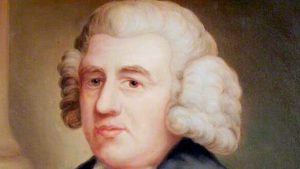
John Newton (1725 – 1807)
John Newton lived in Olney for nearly 16 years (1764 to 1779) as curate-in-charge of the parish church, St Peter & St Paul.
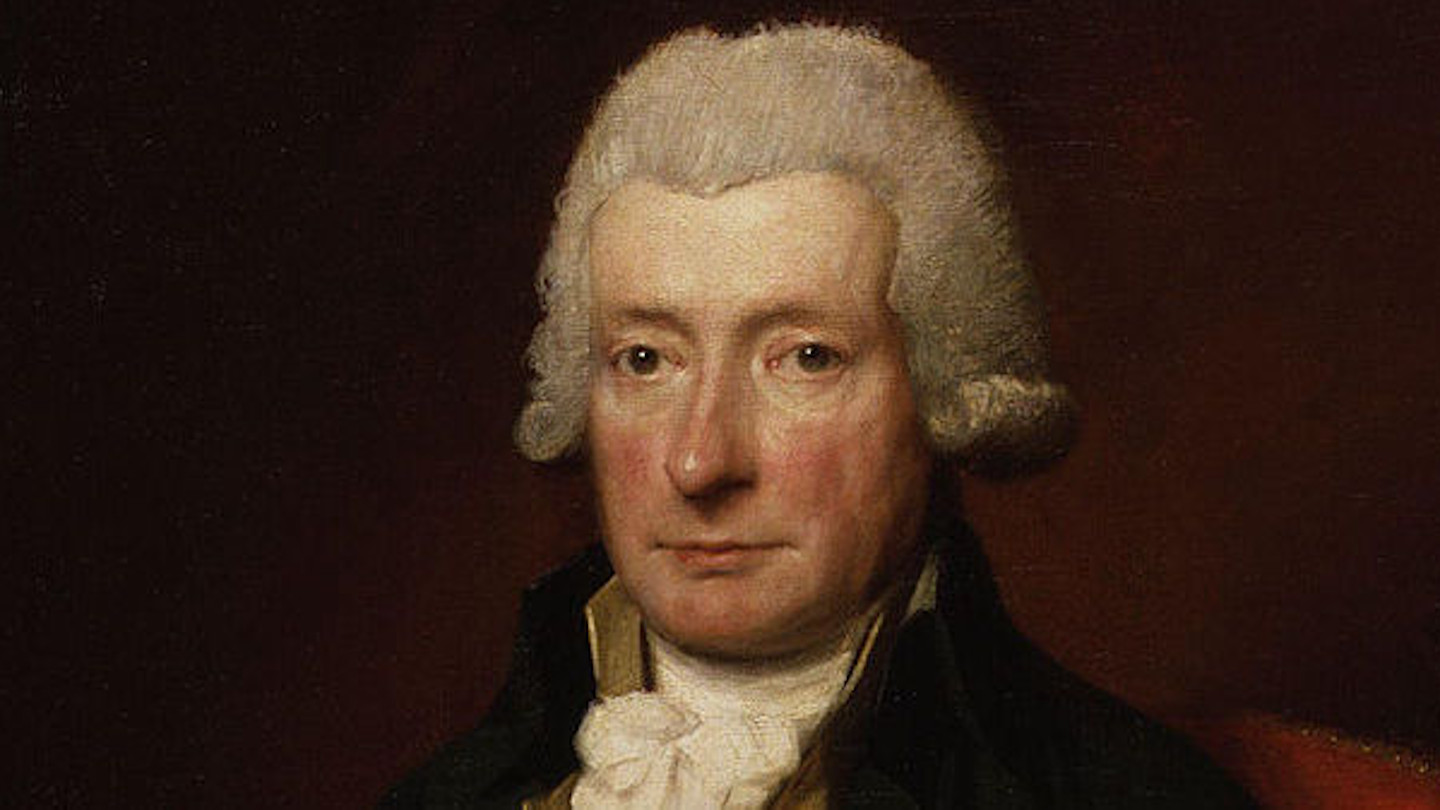
William Cowper (1731-1800), pronounced “Cooper”, was a renowned 18th century poet and translator of Homer. His most famous works include his 5000-line poem ‘The Task’ and some charming and light-hearted verses, not least ‘The Diverting History of John Gilpin’. Phrases he coined such as ‘Variety is the spice of life’ are still in popular use today. While living in Olney he collaborated on ‘The Olney Hymns’ with his friend John Newton. Keep reading to find out more about his life…
The darkest day if you live till tomorrow will have pass’d away.
The Needless Alarm, A Tale – William Cowper
Portrait of William Cowper by William Blake
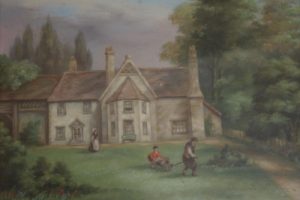
William Cowper was born in Berkhamsted, Hertfordshire in 1731 to Reverend John Cowper and Ann, daughter of Roger Donne of Ludham Hall, Norfolk. Tragically, Cowper’s mother died when he was 6 years old. Cowper’s background was that of a gentleman – his great uncle Earl Cowper had been Lord Chancellor of England – but all his life he suffered from lack of money and was dependent on friends and family and occasional journalism to make ends meet. From 1742 he attended Westminster School in London, , where like all young men of his time he studied the Classics and finished third in his year.
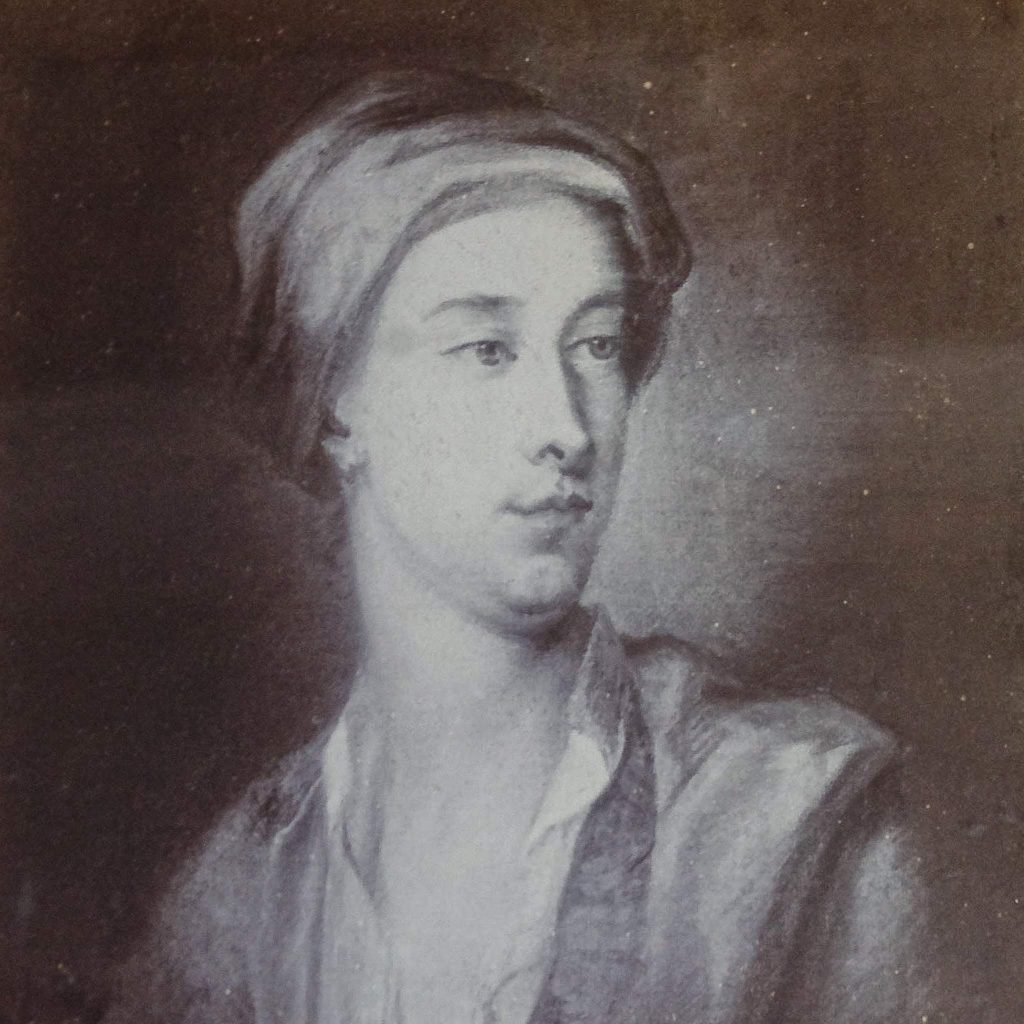
Following his schooling, Cowper began training in law in 1749, following in the footsteps of other members of his family. He attended Middle Temple followed by the Inner Temple. This is why he was named as “William Cowper of the Inner Temple” in his published works. He enjoyed life in London, the coffee-houses and theatres, and he was a frequent visitor to the house of his uncle, Ashley Cowper, barrister and Clerk to the Houses of Parliament . At the age of 23 William was called to the Bar.
Last week with Delia, gentle maid! Far hence in happier fields I stray’d
A poem written by William Cowper to Theodora (“Delia”) after leaving her at New Burns.
In 1755, Cowper experienced his first lost love. He hoped to marry his cousin Theodora but Ashley Cowper forbade the match due to William’s lack of prospects and the tendency of the pair to ‘melancholy’, a form of depression. Theodora never married and continued secretly to send William money and gifts throughout his life. The following year, Cowper lost his father, and his best friend Sir William Russell. It was at this time that Cowper experienced his first significant melancholic episode.
(Those) to whom a public exhibition of themselves is mortal poison, may have some idea of the horrors of my situation
William Cowper on his upcoming examination to become Keeper of the Journals in the House of Lords
In 1763 Cowper seems to have attempted suicide. He had some form of mental breakdown, triggered by the prospect of a public examination to become Keeper of the Journals in the House of Lords. This well-paid post was normally controlled by the Cowper family, but there was a rival candidate. Cowper was sent to the asylum in St Albans run by Dr Cotton, who was one of the first people in England to treat mental problems as an illness. Prayer was part of the treatment. Cowper’s gradual recovery coincided with the beginning of his conversion to Christian evangelicalism. After a year in St Albans Cowper’s family arranged for him to move, with a manservant, to lodgings in Huntingdon. He knew no-one there, but it was close to Cambridge where his brother John was a Fellow at the University.
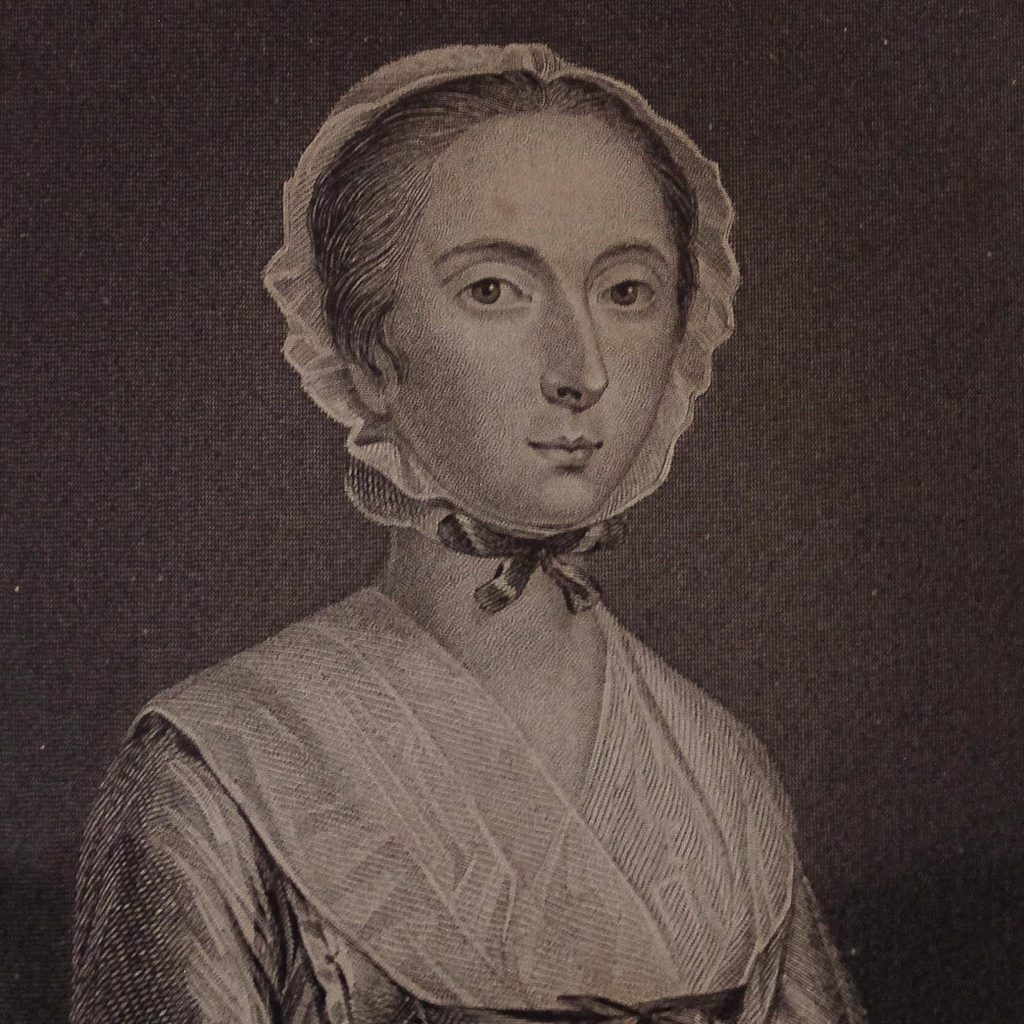
In Huntingdon Cowper made the acquaintance of William Unwin, then studying theology at Cambridge. He was befriended by William’s family and moved in with them. William’s mother Mary Unwin treated him like a second son. Following the death in 1767 of William’s father Rev. Morley Unwin, Mary Unwin and her daughter, and Cowper, moved to Olney, invited there by the Curate-in-charge, John Newton. Newton initially shared his house with them. The following year, the family moved to Orchard Side (now the Museum). In 1773, William suffered another major breakdown. He felt forsaken by God. He ceased to attend church, but continued with Newton to write occasional hymns. These were included by Newton in the Olney Hymns, published in 1779.
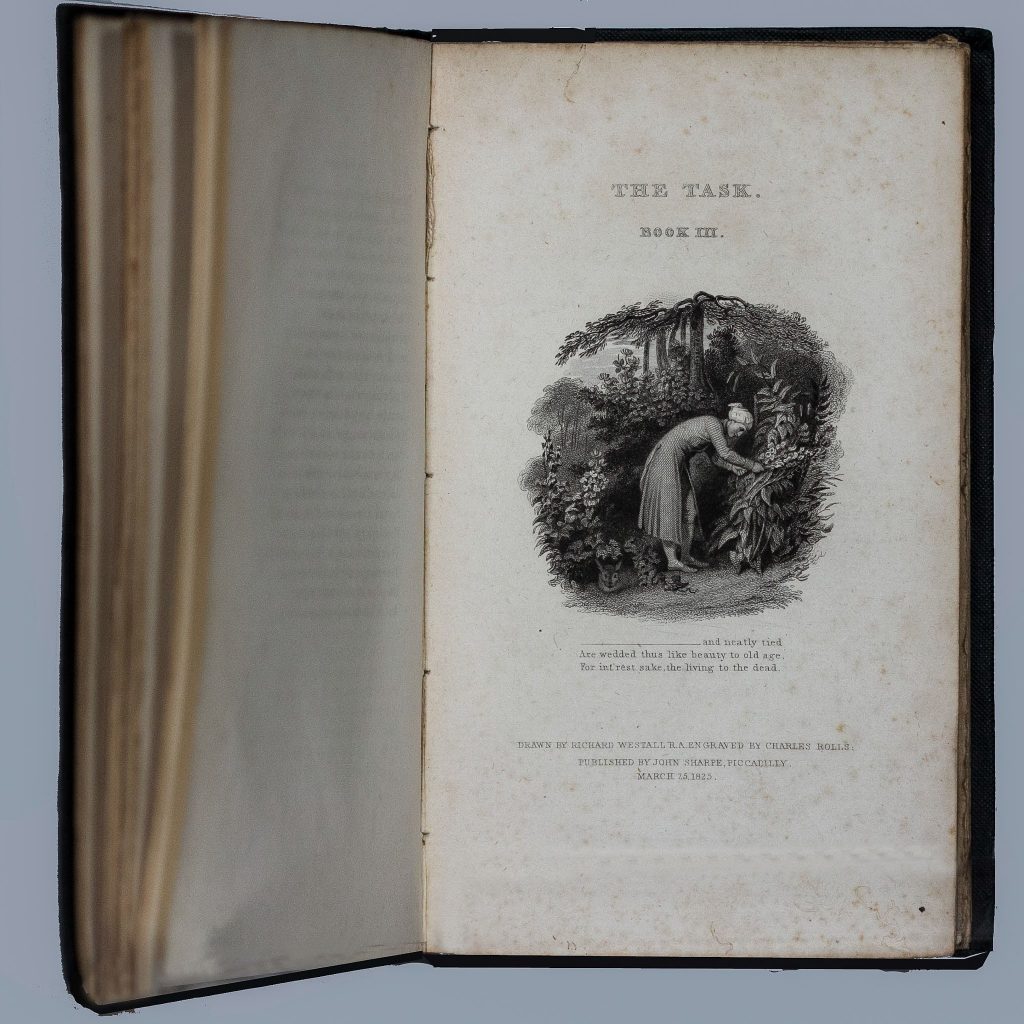
In the early 1780s Cowper experienced the most productive period of his career. His first signed work was probably his enormously popular description of his three hares, published in The Gentleman’s Magazine. In 1781 he published his first book of poems under his own name. It was not a success, but the second book in 1785 established Cowper’s reputation . It contained both ‘The Task’ and the ballad of John Gilpin ‘The Task’ was inspired by his new and witty friend Lady Austen, who, when Cowper complained of writer’s block, encouraged him to write on the insignificant subject of his own sofa. ‘The Task’ constantly compares the vices of city life with the pleasures of the countryside, and Cowper became known for his quiet life style in and around Olney.
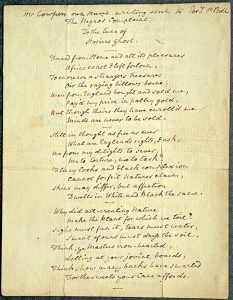
Cowper and Mrs Unwin moved to Weston Underwood in 1786, the year before The Committee for the Abolition of the Slave Trade was established.
Through the encouragement of his friend and abolitionist, John Newton, Cowper became involved in their work, writing four poems in support of their cause.
The most influential was ‘The Negro’s Complaint’, which was later quoted by Rev. Martin Luther King Jr.
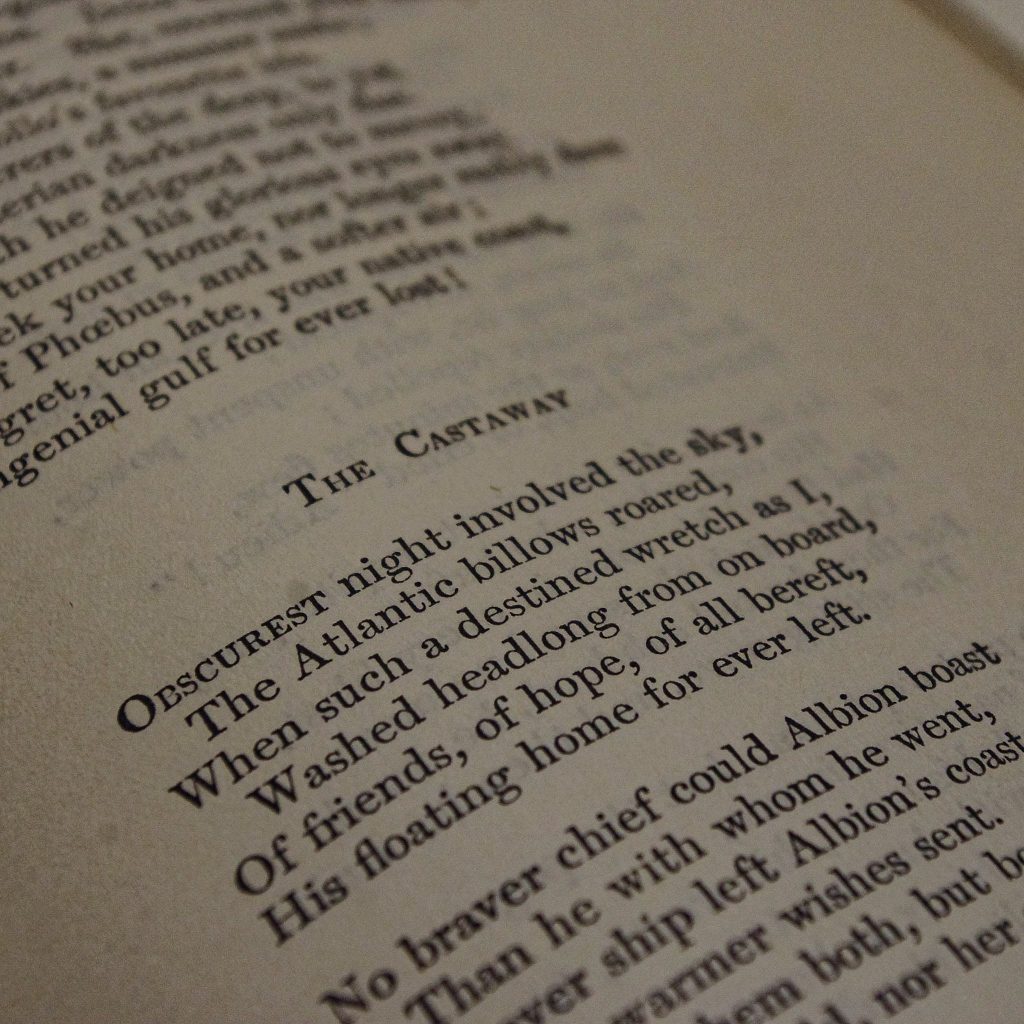
William continued writing throughout his declining years after Mary Unwin’s death in 1795. His poem the Castaway from 1799 is thought by many to be his finest poem, describing his mental traumas. He died on 25 April 1800, in East Dereham, having moved to live with his cousin, Jonny Johnson, for his and Mrs Unwin’s health in 1795. William’s poetry influenced many of the great poets that followed, such as Wordsworth, Coleridge and Tennyson. He was also popular with many of the later novelists such as Jane Austen, who quotes him in four of her novels, and the Brontë sisters.

John Newton lived in Olney for nearly 16 years (1764 to 1779) as curate-in-charge of the parish church, St Peter & St Paul.
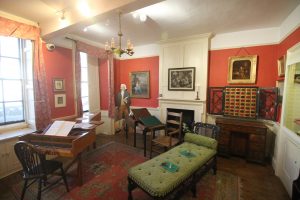
The Parlour, with a window onto the Market Place, was the social hub of the house; a place to write, meet with family and friends and drink tea. ‘Now stir the fire, and close the shutters fast, Let fall the curtains, wheel the sofa round…
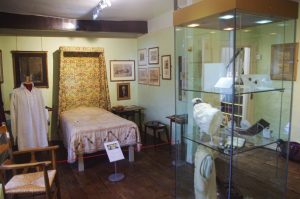
William Cowper’s Bedroom – Greatcoats to waistcoats, shoe buckles to day caps, depression & fame … Take a glimpse into the 18th century life of a foremost poet, letter writer & translator of Homer

Visit our tranquil & historic Gardens. William Cowper was an innovative gardener at a time when seeds & plants were arriving from North America. Find out more here, including a plan of the gardens.
Receive our latest news and updates delivered straight to your inbox
Museum and Gardens - £10.00 (includes an annual pass)
Gardens only - £4
Children under 16 - FREE
Hours: 11.00 - 4.30 (last entry 3.30)
Days: Tuesday, Wednesday, Thursday, Friday and Saturday
Open 29th March 2024 on Good Friday
Last opening day of this season is Wednesday 18th December 2024
The Olney Hymns
The hymns written by Cowper and Newton may have been first sung at Newton’s meetings in the Great House. Two hymns, Cowper’s ‘Jesus, Where’er Thy People Meet’ and Newton’s ‘On Opening a Place for Social Prayer’ were written for the move of the Tuesday prayer meeting for adults into the largest room in the Great House in 1769.
Some of the hymns had been published in other publications before 1779. Amongst these were:
Oh! for a closer walk with God
God moves in a mysterious way
Safely through another week
Encouraged by thy word
‘Copies of a few of these Hymns have already appeared in periodical publications, and in some recent collections. I have observed one or two of them attributed to persons who certainly had no concern in them, but as transcribers. All that have been at different times parted with in manuscript are included in the present volume; and (if the information were of any great importance) the public may be assured, that the whole number were composed by two persons only.’
We only have a little information about the tunes to which the hymns were originally sung. To which are added hymns &c
An Authentic Narrative
An Authentic Narrative began in 1762 as eight letters to Benjamin Fawcett, a Presbyterian minister at Kidderminster, who had asked Newton to write down more about his eventful life.
Newton’s letters were then seen by an evangelical clergyman Rev Thomas Haweis. He saw their potential as a spiritual narrative for general readers and asked Newton to add more detail, which extended the number of letters to 14. Haweis arranged their publication. Newton’s name did not appear but he was soon known to be the author.
The book brought him to the notice of potential patrons, including Lord Dartmouth, who helped him secure ordination and appointed him to his first parish in Olney.
Model of a slave ship in cross-section, showing how enslaved people were transported to the Americas.
During his seafaring career John Newton had no scruples about the lawfulness of the slave trade.
From the 17th century onwards the demand for slave labour to work in the American colonies grew. Slavery had existed in Africa long before the Europeans arrived, but to satisfy demand traders searched far inland, devastating communities.
By the 18th century Britain, of all the European countries, was the most active in the trade. It is said that between 1640 and 1807, the year the British Parliament passed the Bill to abolish slave trading by British subjects, British ships had transported as many as 3.4 million Africans across the Atlantic.
Newton’s letter to his wife, written at sea
When Newton transcribed this letter for publication in Letters to a Wife, published in 1793 after Mary’s death, he omitted his mention of the slaves. Elsewhere in the book he describes his involvement in this ‘vile trade’.
“I felt the disagreeableness of the business very strongly. The office of a gaoler, and the restraints under which I was forced to keep my prisoners, were not suitable to my feelings; but I considered it as the line of life which God, in his providence had allotted me, and as a cross which I ought to bear with patience and thankfulness till he should be pleased to deliver me from it. Till then, I only thought myself bound to treat the slaves under my care with gentleness, and to consult their ease and convenience so far as was consistent with the safety of the whole family of whites and blacks on board my ship.”
Newton’s letter to his wife, written at sea, page 2
In Liverpool, as Newton was preparing a new ship, the Bee, to sail on the next slave trading journey, he suffered a seizure which forced him to look for work on land.
His next job was as Tide Surveyor in the Port of Liverpool, applying customs rules to incoming ships. The role left him time for self-education and his first attempts at preaching.
View of Olney Church, with Great House and Mill
It took Newton ten years after he retired from life at sea to be ordained as a Church of England minister. Ordination was difficult for anyone to achieve without a university degree.
In preparation for ordination Newton read and studied extensively, but his known connections to Rev John Wesley, Rev George Whitefield and other Gospel and Non-conformist ministers would not have helped his case. Mary’s family helped dissuade him from taking a post outside the established Church of England.
Market Place, Olney
Three years after the Newton’s arrived, William Cowper, Mrs Mary Unwin and her daughter moved into the handsome house on the centre right of the picture, now the Cowper & Newton Museum.
This was the beginning of a long acquaintance between the two men which resulted in the compilation of the Olney Hymns.
In 1796, a survey of the Market Place notes, ‘The Dwellings comprized in No 13 (the Market Place) are very old, they stand in the middle of Olney Street, and are rather a nuisance.’ These building included the town Lock Up (seen in the painting) and the Shiel Hall in which on the top floor a school was run.
‘The Town of Olney has a long Street of above half a Mile: at the Bottom stand the Church. The Market, which is on a Monday, is kept about the Middle of the Street, on a sort of a Square, there are good Shambles, but no Market House. The Fairs are on Easter Monday & St Peter’s Day June 29.’ Rev William Cole of Bletchley (1714 – 1782)
John Newton’s Writing Desk
When the Newtons moved from Olney to the City of London at the end of 1779, his furniture was put up for sale. This was more practical than depending on horse and cart to transport large items over long distances.
The desk appears in a later sale of household goods as having been John Newton’s, and on the reverse of the sliding writing panel is a handwritten note confirming his ownership
Amazing Grace, from the first edition of the Olney Hymns
The idea of writing a hymn to prepare an audience for a sermon was something Newton did regularly. The hymn’s original title was Faith’s Review and Expectation.
Through the 18th and 19th century, Amazing Grace was printed separately in some hymn compilations in England and Scotland, including, ‘A Select Collection of Hymns Universally Sung in all the Countess of Huntingdon’s Chapels. (1780)’ and ‘A Collection of Hymns for the use of the Protestant Church of the United Brethren’ (1789).
Its later fame though was owed to its popularity in America. The hymn was first published in New York in 1790 and became particularly popular at Christian revival meetings.
Church of St Mary Woolnoth, City of London
Newton quickly established himself as a popular gospel preacher and, as in Olney, the congregation of St Mary Woolnoth grew rapidly.
He also gave spiritual talks in the houses of influential Londoners, and continued the publication of his pastoral letters. In 1781 he published Cardiphonia, letters to prominent people in evangelical circles in London. The book was widely read.
Thoughts upon the African Slave Trade, John Newton, 1788
Newton’s identified written contribution to the abolition movement came about relatively late in his life. His involvement in the slave trade was not a topic he published in writing until the 1780s.
It is likely that he did discuss the slave trade with his friend William Cowper in Olney and many others in both Liverpool and London.
Cowper wrote about his opposition to slavery in his poems Charity (1782) and The Task (1784).
As a well-know published poet, he was also approached to write poems specifically for the abolition campaign: The Negro’s Complaint, Pity for Poor Africans, The Morning Dream and Sweet Meat has Sour Sauce: or, the Slave Trader in the Dumps were all written in 1788 although some did not appear in print until later.
Newton took no profits from the sale of this pamphlet, asking that revenue be paid to the Sunday School Society.
A detail from the model slave ship cross section
’11th December 1752
‘…By the favour of Divine Providence made a timely discovery today that the slaves were forming a plot for an insurrection. Surprised 2 of them attempting to get off their irons, and upon farther search in their rooms, upon the information of 3 of the boys, found some knives, stones, shot, etc, and a cold chissel.’
John Newton’s journal for the slave ship the African
The Olney Hymns, Preface
The early friendship between the two men was based on their faith. Cowper had aristocratic relatives and his background was very different to Newton’s. As a young man he suffered a severe breakdown. He found peace of mind helping Newton in the parish of Olney.
It is likely that Cowper’s hymns were written in the early 1770s. On New Year’s Day 1773, the day on which Newton preached his ‘Amazing Grace’ sermon, Cowper came close to suicide, believing that God had rejected him.
Cowper’s career as a poet took off only in the 1780s.
Interior of Olney Church, showing the gallery constructed in 1765
Newton wrote to his friend Clunie in February 1765, ‘A plan has been made, and the estimate is eighty-five pounds – to have four depths of handsome pews, and an open seat behind …I intend to have the best front seat for the accommodation of my friends’.
Newton subscribed five guineas to the cost, although he could barely afford it.
A guest at the vicarage in 1766: Samson Occom
Newton’s diary for June 1766* reads, ‘I went in the post-chaise and brought Mr Occom the Indian from Northampton; he preached in the evening to a great auditory for so short a warning. Meeting House and yard quite full … he said many striking things of the Lord’s work in America’
After the visit Occom recorded in his diary, ‘this Mr Newton is a Minister of the Church of England; he was a sailor and God marvellously turned him and he is a flaming Preacher of the Gospel’
* John Newton’s 1766 diary edited by Marylynn Rouse, 2022.
Picture credit: The National Portrait Gallery.
Olney Vicarage
Olney’s vicar in Newton’s time was Rev Moses Browne, an absentee in London who refused to surrender the income from his Olney living.
As curate, Newton maintained a regular pattern of church services, including two services on Sunday. He frequently preached elsewhere, travelling on horseback considerable distances from Olney.
Unusually for an Anglican minister he was happy to speak at the Baptist and Independent meetings in Olney.
Storm at sea
Newton’s friend Richard Cecil began writing this biography shortly before Newton died and with his endorsement. Like Newton, Cecil was a founder member of an evangelical Anglican group known as the Eclectic Society. They sometimes met in the vestry of Cecil’s church in Bedford Row in London. The anti-slavery campaigner and Member of Parliament William Wilberforce was to become a member.
‘The 10th (that is in the present stile the 21st) of March, is the day much to be remembered by me, and I have never suffered it to pass wholly unnoticed since the year 1748. On that day the Lord sent from on high and delivered me out of deep waters.’
An Authentic Narrative
Birth of Mary Newton recorded in the Catlett Family Bible
Mary’s younger brother, named George after his father, died in 1774 leaving an infant daughter Elizabeth (Betsy). She was adopted by the Newtons and came to live in Olney. John and Mary had no children of their own and Betsy was much loved. She later looked after Newton in his old age.
A second child Eliza joined the Newtons’ London household in 1783. She was the surviving daughter of Mary’s sister Elizabeth. To Newton’s great grief Eliza died aged 14 of consumption, the same illness that had killed her parents and brother.
The Catlett Family Bible
Mary’s mother Elizabeth Churchill had been a close friend of John Newton’s mother. Some years after her death the Catletts invited Elizabeth’s son John to visit them in Chatham. In December 1742 the 18-year old John Newton knocked on their door and met 13-year old Mary. For Newton it was the beginning of a love affair that lasted his entire life. He described in An Authentic Narrative how his passion to see Mary led to him being press-ganged onto a Royal Navy ship.
When Newton returned to England from Sierra Leone aboard the Greyhound in 1748, both the Catlett and Newton families finally agreed the two could marry.
A fold out map of the coast of Guinea, West Africa
Newton first arrived in West Africa in 1745 as a crew member on a merchant ship. After his poor behaviour alienated him from those in charge, he left the ship with a Mr Evans, to work for him as a land based slave trader. His new employer built a slave compound, or factory, on the Plantane Islands, just off the coast of Sierra Leone.
Later Newton was given permission to work for another slave trader and moved to Kittam.
‘If you cast your eyes upon a large map of Africa while you are reading this, you will have a general idea of the country I was in; for though the maps are very incorrect, most of the places I have mentioned are inserted, and in the same order as I have named them.’
An Authentic Narrative
Newton first visited West Africa in 1745 on a merchant ship, the Pegasus. Newton’s behaviour was so bad that he fell out with the captain. When the ship departed for the West Indies, Newton chose to stay behind to make his fortune working with a slave trader Amos Clow.
Clow had a slave compound, or factory, on the Plantane Islands, just off the coast of Sierra Leone. Newton spent months there in captivity.
An Authentic Narrative was based on some early letters that Newton wrote about his seafaring life when he was studying for ordination. Newton described his childhood, his early adventures and emergence as captain of a slave-trading ship.
The book was written long before Newton’s participation in the abolitionist campaign. Although he says that he himself was treated like a slave when he started working on the West African coast, the book shows little sympathy for enslaved Africans.
Newton’s letters were seen by an evangelical clergyman Thomas Haweis, who saw their potential as a spiritual narrative for general readers. Haweis arranged their publication. Newton’s name did not appear but he was soon known to be the author. The book brought him to the notice of potential patrons, including Lord Dartmouth, who helped him secure ordination and appointed him to his first parish in Olney.
Our Museum building remains CLOSED. We are opening our gardens on limited entry. The Cowper & Newton Museum gardens will be open to welcome you on Wednesday 5th August 10.30 – 12.15 and Saturday 8th August 10.30 – 12.15
(Follow our social media accounts or check back here for further opening days & times as they become available)
